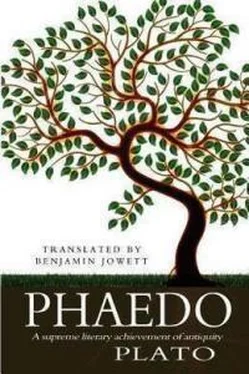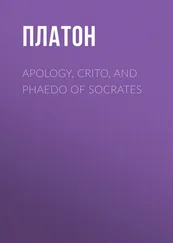Платон - Phaedo
Здесь есть возможность читать онлайн «Платон - Phaedo» весь текст электронной книги совершенно бесплатно (целиком полную версию без сокращений). В некоторых случаях можно слушать аудио, скачать через торрент в формате fb2 и присутствует краткое содержание. Год выпуска: 2014, Издательство: epubBooks Classics, Жанр: Философия, на английском языке. Описание произведения, (предисловие) а так же отзывы посетителей доступны на портале библиотеки ЛибКат.
- Название:Phaedo
- Автор:
- Издательство:epubBooks Classics
- Жанр:
- Год:2014
- ISBN:нет данных
- Рейтинг книги:3 / 5. Голосов: 1
-
Избранное:Добавить в избранное
- Отзывы:
-
Ваша оценка:
- 60
- 1
- 2
- 3
- 4
- 5
Phaedo: краткое содержание, описание и аннотация
Предлагаем к чтению аннотацию, описание, краткое содержание или предисловие (зависит от того, что написал сам автор книги «Phaedo»). Если вы не нашли необходимую информацию о книге — напишите в комментариях, мы постараемся отыскать её.
Phaedo — читать онлайн бесплатно полную книгу (весь текст) целиком
Ниже представлен текст книги, разбитый по страницам. Система сохранения места последней прочитанной страницы, позволяет с удобством читать онлайн бесплатно книгу «Phaedo», без необходимости каждый раз заново искать на чём Вы остановились. Поставьте закладку, и сможете в любой момент перейти на страницу, на которой закончили чтение.
Интервал:
Закладка:
It is objected by Simmias and Cebes that these arguments only prove a former and not a future existence. Socrates answers this objection by recalling the previous argument, in which he had shown that the living come from the dead. But the fear that the soul at departing may vanish into air (especially if there is a wind blowing at the time) has not yet been charmed away. He proceeds: When we fear that the soul will vanish away, let us ask ourselves what is that which we suppose to be liable to dissolution? Is it the simple or the compound, the unchanging or the changing, the invisible idea or the visible object of sense? Clearly the latter and not the former; and therefore not the soul, which in her own pure thought is unchangeable, and only when using the senses descends into the region of change. Again, the soul commands, the body serves: in this respect too the soul is akin to the divine, and the body to the mortal. And in every point of view the soul is the image of divinity and immortality, and the body of the human and mortal. And whereas the body is liable to speedy dissolution, the soul is almost if not quite indissoluble. (Compare Tim.) Yet even the body may be preserved for ages by the embalmer's art: how unlikely, then, that the soul will perish and be dissipated into air while on her way to the good and wise God! She has been gathered into herself, holding aloof from the body, and practising death all her life long, and she is now finally released from the errors and follies and passions of men, and for ever dwells in the company of the gods.
But the soul which is polluted and engrossed by the corporeal, and has no eye except that of the senses, and is weighed down by the bodily appetites, cannot attain to this abstraction. In her fear of the world below she lingers about the sepulchre, loath to leave the body which she loved, a ghostly apparition, saturated with sense, and therefore visible. At length entering into some animal of a nature congenial to her former life of sensuality or violence, she takes the form of an ass, a wolf or a kite. And of these earthly souls the happiest are those who have practised virtue without philosophy; they are allowed to pass into gentle and social natures, such as bees and ants. (Compare Republic, Meno.) But only the philosopher who departs pure is permitted to enter the company of the gods. (Compare Phaedrus.) This is the reason why he abstains from fleshly lusts, and not because he fears loss or disgrace, which is the motive of other men. He too has been a captive, and the willing agent of his own captivity. But philosophy has spoken to him, and he has heard her voice; she has gently entreated him, and brought him out of the 'miry clay,' and purged away the mists of passion and the illusions of sense which envelope him; his soul has escaped from the influence of pleasures and pains, which are like nails fastening her to the body. To that prison–house she will not return; and therefore she abstains from bodily pleasures—not from a desire of having more or greater ones, but because she knows that only when calm and free from the dominion of the body can she behold the light of truth.
Simmias and Cebes remain in doubt; but they are unwilling to raise objections at such a time. Socrates wonders at their reluctance. Let them regard him rather as the swan, who, having sung the praises of Apollo all his life long, sings at his death more lustily than ever. Simmias acknowledges that there is cowardice in not probing truth to the bottom. 'And if truth divine and inspired is not to be had, then let a man take the best of human notions, and upon this frail bark let him sail through life.' He proceeds to state his difficulty: It has been argued that the soul is invisible and incorporeal, and therefore immortal, and prior to the body. But is not the soul acknowledged to be a harmony, and has she not the same relation to the body, as the harmony—which like her is invisible—has to the lyre? And yet the harmony does not survive the lyre. Cebes has also an objection, which like Simmias he expresses in a figure. He is willing to admit that the soul is more lasting than the body. But the more lasting nature of the soul does not prove her immortality; for after having worn out many bodies in a single life, and many more in successive births and deaths, she may at last perish, or, as Socrates afterwards restates the objection, the very act of birth may be the beginning of her death, and her last body may survive her, just as the coat of an old weaver is left behind him after he is dead, although a man is more lasting than his coat. And he who would prove the immortality of the soul, must prove not only that the soul outlives one or many bodies, but that she outlives them all.
The audience, like the chorus in a play, for a moment interpret the feelings of the actors; there is a temporary depression, and then the enquiry is resumed. It is a melancholy reflection that arguments, like men, are apt to be deceivers; and those who have been often deceived become distrustful both of arguments and of friends. But this unfortunate experience should not make us either haters of men or haters of arguments. The want of health and truth is not in the argument, but in ourselves. Socrates, who is about to die, is sensible of his own weakness; he desires to be impartial, but he cannot help feeling that he has too great an interest in the truth of the argument. And therefore he would have his friends examine and refute him, if they think that he is in error.
At his request Simmias and Cebes repeat their objections. They do not go to the length of denying the pre–existence of ideas. Simmias is of opinion that the soul is a harmony of the body. But the admission of the pre–existence of ideas, and therefore of the soul, is at variance with this. (Compare a parallel difficulty in Theaet.) For a harmony is an effect, whereas the soul is not an effect, but a cause; a harmony follows, but the soul leads; a harmony admits of degrees, and the soul has no degrees. Again, upon the supposition that the soul is a harmony, why is one soul better than another? Are they more or less harmonized, or is there one harmony within another? But the soul does not admit of degrees, and cannot therefore be more or less harmonized. Further, the soul is often engaged in resisting the affections of the body, as Homer describes Odysseus 'rebuking his heart.' Could he have written this under the idea that the soul is a harmony of the body? Nay rather, are we not contradicting Homer and ourselves in affirming anything of the sort?
The goddess Harmonia, as Socrates playfully terms the argument of Simmias, has been happily disposed of; and now an answer has to be given to the Theban Cadmus. Socrates recapitulates the argument of Cebes, which, as he remarks, involves the whole question of natural growth or causation; about this he proposes to narrate his own mental experience. When he was young he had puzzled himself with physics: he had enquired into the growth and decay of animals, and the origin of thought, until at last he began to doubt the self–evident fact that growth is the result of eating and drinking; and so he arrived at the conclusion that he was not meant for such enquiries. Nor was he less perplexed with notions of comparison and number. At first he had imagined himself to understand differences of greater and less, and to know that ten is two more than eight, and the like. But now those very notions appeared to him to contain a contradiction. For how can one be divided into two? Or two be compounded into one? These are difficulties which Socrates cannot answer. Of generation and destruction he knows nothing. But he has a confused notion of another method in which matters of this sort are to be investigated. (Compare Republic; Charm.)
Then he heard some one reading out of a book of Anaxagoras, that mind is the cause of all things. And he said to himself: If mind is the cause of all things, surely mind must dispose them all for the best. The new teacher will show me this 'order of the best' in man and nature. How great had been his hopes and how great his disappointment! For he found that his new friend was anything but consistent in his use of mind as a cause, and that he soon introduced winds, waters, and other eccentric notions. (Compare Arist. Metaph.) It was as if a person had said that Socrates is sitting here because he is made up of bones and muscles, instead of telling the true reason—that he is here because the Athenians have thought good to sentence him to death, and he has thought good to await his sentence. Had his bones and muscles been left by him to their own ideas of right, they would long ago have taken themselves off. But surely there is a great confusion of the cause and condition in all this. And this confusion also leads people into all sorts of erroneous theories about the position and motions of the earth. None of them know how much stronger than any Atlas is the power of the best. But this 'best' is still undiscovered; and in enquiring after the cause, we can only hope to attain the second best.
Читать дальшеИнтервал:
Закладка:
Похожие книги на «Phaedo»
Представляем Вашему вниманию похожие книги на «Phaedo» списком для выбора. Мы отобрали схожую по названию и смыслу литературу в надежде предоставить читателям больше вариантов отыскать новые, интересные, ещё непрочитанные произведения.
Обсуждение, отзывы о книге «Phaedo» и просто собственные мнения читателей. Оставьте ваши комментарии, напишите, что Вы думаете о произведении, его смысле или главных героях. Укажите что конкретно понравилось, а что нет, и почему Вы так считаете.










